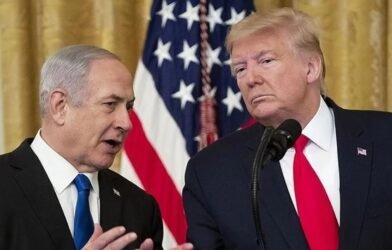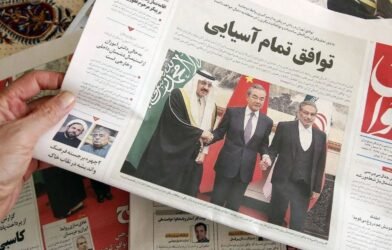Subtotal $0.00
At the beginning of former President Donald Trump's presidency, US foreign policy was a mystery to even the closest allies of the United States, as the man worked to reverse many of the agreements made by America after World War II, starting with European allies, Asian friends, and lowering the wing to countries long seen as rogue powers, such as his talks with North Korea and his good relationship with Russian President Putin.
He has already withdrawn from some of the agreements and organizations that his predecessors entered, such as the Paris Climate Agreement, the United Nations Framework Convention on Climate Change (UNFCCC), the 5+1 nuclear deal with Iran (JCPOA), the Trans-Pacific Partnership (TPP) and many others, and has threatened to withdraw from others, notably the Atlantic Treaty Organization (NATO) and the World Trade Organization (WTO). on top of the North Atlantic Treaty Organization (NATO) and the World Trade Organization (WTO). He has practiced blackmail on even his closest allies, such as the Europeans, the Gulf and East Asians, accusing them of parasitizing on US power and not paying their dues for protection.
What's more, he has often ignored the arsenal of American experts - academics, bureaucrats, and diplomats - that institutionalize American politics, replacing them with a host of relatives such as his daughter Ivanka and her husband Jared Kushner, former professional colleagues such as Jason Greenblatt, and frequently firing/resigning his staff, such as National Security Advisors Michael Flynn and John Bolton, Secretary of State Rex Tillerson, and Secretary of Defense James Mattis. John Bolton, Secretary of State Rex Tillerson, and Secretary of Defense James Mattis, and left many State Department positions such as directors and ambassadors vacant for a long time, and relied on a limited group of people in building his policies; this was most evident in the so-called deal of the century, which was born deformed at the Manama conference (June 25, 2019) called the "Peace for Prosperity Workshop." This was most clearly manifested in its clearest form in the so-called Deal of the Century, which was born deformed in the Manama conference (June 25, 2019).
Trump has also been so blunt in his rhetoric and his disregard for diplomatic norms that many world leaders, even his allies, have privately and publicly expressed their resentment of his cheap way of receiving, shaking hands and talking to them. This is no less bad with regard to women and minority rights, and his targeting of Muslims since his first term, through a decision banning citizens of eight mostly Muslim countries from entering his country, which dealt a painful blow to the image of the United States of America abroad, which was the result of long work and was a manifestation of American soft power, then his poor management of the Corona pandemic, which he started by denying and then blaming others, without sufficient awareness of the seriousness of the disease and its effects, it seems.
He did not want to leave office until he was about to demolish the building on which the country was built, namely democracy, through his constant denial of the election results and finally inciting the mob and some far-right groups to storm the Capitol Hill, placing the American model, which American thinker Francis Fukuyama was so proud of that he placed it as the end of history, with the Middle Eastern countries that lie at the bottom of human civilization in the American consciousness.
Just as Donald Trump sacrificed Palestinian rights under the title of the deal of the century, and worked as an active secretary of state to pressure everyone to achieve Israeli Prime Minister Netanyahu's normalization goals, aiming to get closer to his American allies in the pro-Israel lobby and Christian right forces, hoping that this would help him win the presidency again. For the same reason, he has put the future of his country on the brink of the abyss, so that "white American terrorism" and not "Islamic terrorism" is what the FBI is after, as happened at the inauguration of new President Joe Biden when the National Guard checked the identities of members of the National Guard.
This heavy legacy leaves us with a number of questions, perhaps the most important of which are related to the extent of the damage that Trump has caused within American society, the extent of the widening societal gap between its components, the possibility of its impact on the performance of the state and its departure from caring about the outside world or making this a secondary matter, the possibility of compromising the future of the United States of America as a dominant power in the world, and the subsequent imbalances in the international pattern if this status is affected, especially with the rise of ambitious regional powers such as Brazil, Korea, Iran and Turkey, and others that aspire to play a global role across the region, such as China and India.
The carrot and stick strategy that the United States has always used to subjugate the countries of the world and force them to recognize American leadership, based on a formidable military deterrent force and the strongest economy in the world, could be greatly affected if those countries that have tuned their foreign relations to the American tune smell some of the decline of the American presence and preoccupation with internal affairs, which could encourage many of them to engage in regional adventures that could plunge the whole world into a kind of "creative chaos". This could encourage many of them to engage in regional adventures that could plunge the entire world into a kind of "creative chaos," the result of which would be a new world that America would be forced to deal with.
Trump may not have won enough seats, but he did destroy a lot of them on the principle of me and my enemies. Will Biden's term be spent trying to avoid Trump's mistakes and recover what he gave up, at a time when everyone is talking about China's meteoric rise, making the gap between the two powers rapidly shrink, and turning China into a new global pole, which the United States will soon have to recognize as a partner or adversary, and will most likely end the unipolarity that emerged on the international political scene after the collapse of the Soviet Union?
We have heard a lot of statements from Biden himself, his Secretary of State and officials in his administration, about getting rid of Trump's legacy and returning to institutionalization and partnership with allies, but not everything that is broken can be repaired, and not all agreements are like the Paris Climate Agreement, to which the Biden administration has announced a return. There is a set of facts that cannot be jumped upon, especially in East and Southeast Asia, the most important of which is that the United States of America is a force that cannot be relied upon when needed, while China, whose trade exchanges reach four trillion dollars with the region, is a historical neighbor that can coexist with it and benefit from its rise, while relying on American democracy and its outcomes is like taking a gamble without calculating the consequences.
In this part of the world, economic considerations have taken precedence over all considerations, even security considerations, as American security alone cannot build a prosperous society, which is what these countries seek. The United States is not in an economic position to pursue a "checkbook" policy, nor can it repeat history despite the presence of some allies in the region, especially after the cancellation of the Trans-Pacific Trade Agreement (TTP) and China's initiative to propose a new trade agreement (RCEP), which represented a more or less alternative to the canceled US agreement and was signed by even traditional US allies such as Japan and Australia.
In this context, the US reaction to the military coup that took place on February 1 in Myanmar, as it is an opportunity for the new administration to review the change after Trump, but despite gathering its European allies, Japan, Australia and many other countries, it was unable to condemn the military regime, and it is not believed that its diplomatic action can directly lead to a real change in the scene, the main reason being the Chinese umbrella, which sees this as harmful to its interests.
We can say that the American ball has rolled down the Asian slope, and it is difficult for Biden and his administration to bring it back to the top again, especially since there is someone who competes with him for this summit, who is more cohesive on the domestic level, stronger on the economic level, and more understanding and closer to the demands of the competition.











